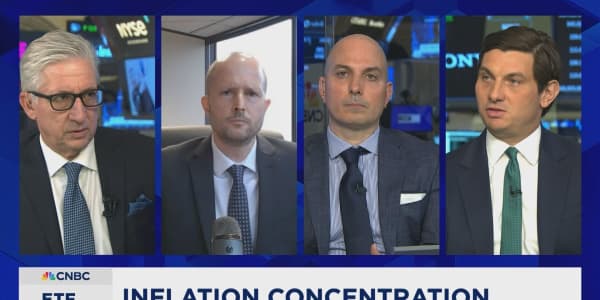
As investors weigh what the growing interest in artificial intelligence means for the marketplace, one analyst thinks that ETF investors should be cautious in utilizing it to aid in strategy selection.
"ChatGPT knows a lot about a lot of things," Art Amador, EquBot Co-Founder, told Bob Pisani on CNBC's 'ETF Edge' on Wednesday. "But if you ask it to put together a portfolio or anything highly sophisticated or technical, it's unable to do so."
Amador runs the AI Powered Equity ETF (AIEQ), an actively managed fund of U.S. stocks selected with a model that uses artificial intelligence.
"We've focused and applied AI specifically to understanding the critical signals in the marketplace," he continued. "Where ChatGPT is very broad in nature."
Amador acknowledged that both EquBot and ChatGPT approach strategies in similar ways. Both use a convolutional knowledge graph, he said, which unites structured and unstructured data, and connects relationships between different concepts, entities and events.
"We're using these deep learning models to make predictions, and then these predictions are measured," he said. "And then the information flows back to the powerful Knowledge Graph, which is probably one of most powerful tools in AI at this time."
Since launching on Nov. 30, ChatGPT has amassed more than 100 million monthly active users, making it the fastest-growing consumer application in history, according to a UBS note published this month.
"I would argue that this is kind of an iPhone moment," Bill Studebaker, president and chief information officer of ROBO Global, said on Monday. "And I think as the field of AI continues to advance, we're kind of moving into uncharted territory."
Studebaker's ROBO Global launched the ROBO Global Robotics and Automation ETF (ROBO) in 2013 as a fund that invests in innovative companies driving robotics, automation, and AI spaces.
"Fast forward 10 years later, we couldn't be more convicted," he continued. "And this wave of innovation is set to hit the world of business and really redefine what's possible."
Studebaker explained that the most transformational companies will be those with the ability to achieve real-time AI powered by information and data.
"Real-time data is the most valuable of all," he said. "If you've got the ability to synthesize and understand the data, you're going to be successful."
The AIEQ is an active fund that, according to Amador, rebalances almost daily. Its largest holdings include Novavax (NVAX), Oracle (ORCL), Unity (UNTY), Roku (ROKU) and Citigroup (C). He describes the stock selection as more of a "bottoms up" approach.
"What we care about is the critical signals for each one of these individual companies," he said.
Amador explained that EquBot extracts these signals from various data sources — news articles, social media posts, research reports, and TV transcripts — and combines them with economic and market data to make price predictions on where the stock is going.
"And then the 140 names that have the highest potential of appreciation or the highest expected returns, those end up going into the portfolio," he added.
Because AI can analyze a greater amount of data in a shorter period, utilizing the stock-picking assistant can offer investors a competitive advantage in comparison to more traditional means. But Amador clarified that not all AI, nor all approaches to AI, are the same.
"Our technical structure, using things like knowledge, graphs, and deep learning models, can be very different from the way someone else approaches the problem," he said. "You want to make sure you're investing with people that have done this before, that have deep expertise and deep knowledge in this space."





